CMA Announces 12 New Members to Hall of Fame
The Country Music Association has announced the 12 luminaries who will become the newest members of the coveted Country Music Hall of Fame. The 12 honorees include 10 special inductees selected earlier this year and two new members normally scheduled to be inducted for 2001. The special inductees are: The Delmore Brothers, The Everly Brothers, Don Gibson, Homer and Jethro, Waylon Jennings, The Jordanaires, Don Law, The Louvin Brothers, Ken Nelson and Webb Pierce. Bill Anderson is the 2001 inductee in the Open Category, and Sam Phillips is being honored in the Non-Performer Category. With the exception of label executive/producer Law, all honorees are affiliated with BMI.
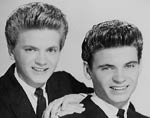 Everly Brothers |
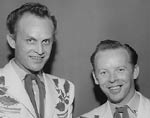 Louvin Brothers |
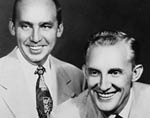 Homer and Jethro |
Formal induction for the 12 new members will take place during special ceremonies at a dinner October 4 in Nashville. The honorees will also be recognized during the 35th Annual CMA Awards on Wednesday, November 7 on CBS-TV.
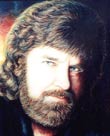 Sam Phillips |
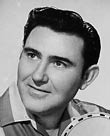 Webb Pierce |
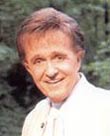 Bill Anderson |
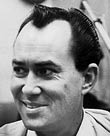 Don Gibson |
The 10 individuals eligible for the special induction have all been final nominees for the Hall of Fame at least three times before. Anderson and Phillips were part of the regular induction process this year in the Open and Non-Performer Categories. All inductees were chosen by the Hall of Fame panel of electors -- more than 300 anonymous voters appointed by the CMA Board of Directors.
"Since 1961, only 74 individuals, duos or groups have been elected to the Country Music Hall of Fame. With the special induction of 10 members along with our regular inductions for 2001, we are able to significantly increase the breadth and range of honorees in the Country Music Hall of Fame," observed CMA Executive Director Ed Benson. "Recognizing them during a special celebration event affords us the time necessary to honor their extraordinary contributions to Country Music with participation from the entire industry."
Alabama natives Alton and Rabon Delmore began singing and picking together as children, quickly mastering a fast-fingered guitar style. They first recorded with Columbia in 1931, joining the Grand Ole Opry a year later. The Delmore Brothers went on to record some of their best-known songs for Bluebird in the late 1930s, including "Big River Blues" and "Nashville Blues." They scored a huge hit in 1949 with "Blues Stay Away from Me," and found renewed popularity with boogie and blues recordings for Cincinnati's King Records after World War II. The Delmore Brothers are considered one of the most popular country music brother duos. Rabon died in 1952, and Alton 12 years later.
Phil and Don Everly's career began early, performing with their parents, and later landing a contract with Cadence Records after high school. Publishers at Acuff-Rose introduced them to Felice and Boudleaux Bryant, who would later write their smash "Bye Bye Love." The song topped the pop and country music charts, making it one of the biggest hits of 1957, and launching the Everly Brothers to teen idol status. The Everly Brothers' unique blend of country and folk scored them countless hits including "Wake Up Little Susie," "Bird Dog" and "All I Have to Do is Dream." The duo split in 1973, but reunited in 1983 to record several albums together. The Everly Brothers continue to tour, serving as a major country influence on generations of pop and rock 'n' roll musicians. Each has won the BMI Country Song of the Year award: Phil in 1976 with "When Will I Be Loved" and Don in 1990 with "Cathy's Clown."
North Carolina native Don Gibson got his start on WNOX radio in Knoxville. By the mid-'50s, he expanded his audience through a string of recordings for RCA, Columbia and MGM, becoming one of the area's most popular performers. Already a talented guitarist, Gibson gained notoriety as a songwriter when Faron Young hit the Top 10 in 1956 with the classic, "Sweet Dreams." His song "I Can't Stop Loving You" was a hit for both Ray Charles and Kitty Wells. His own version of the song in 1958 appeared on the flipside of "Oh Lonesome Me." This double-sided hit marked his first national success as a recording artist, paving the way for him to join the Grand Ole Opry that same year. Gibson continued to tour and perform on the Grand Ole Opry until the 1990s. A living legend, Gibson is considered one of the top record-sellers in country music history. He was named BMI Country Songwriter of the Year in 1967 and has earned more than two dozen BMI Country and Pop honors.
Henry (Homer) Haynes and Kenneth (Jethro) Burns teamed up in 1932 to become a new comedic/musical act, performing on Knoxville radio station WNOX with the Stringdusters Band. Though best known for their comedy, Homer was a phenomenal rhythm guitarist and Jethro was considered to be a great mandolin stylist. They made their first recording for King Records in 1946, subsequently signing with RCA in 1949. Homer and Jethro's many hits include the parodies "That Hound Dog in the Window," "Let Me Go Blubber," "The Battle of Kookamonga" and "Jam-Bowl-Liar." They were also sidemen on many hits by other artists, including Chet Atkins. Except for a brief time during Word War II, their career together spanned 38 years until Homer's death in 1971. Jethro went on to record several more albums before passing away in 1989.
A native of Littlefield, Texas, Waylon Jennings made his first musical mark as a bass player for Buddy Holly's band from 1958-1959. Jennings, who gave up his seat on Holly's fatal plane to J.P. "The Big Bopper" Richardson, went on to pursue his desire to become a singer after Holly's death. Jennings moved to Nashville in 1965 when Bobby Bare helped sign him to the RCA label. His lean, bass-driven sound, long dark hair, and black attire in the 1970s helped define Jennings' image as an outlaw. His success continued with hits such as "I'm A Ramblin' Man" and "Are You Sure Hank Done It This Way." In 1976, Jennings' work was part of country music's first platinum album Wanted: The Outlaws. Over the years, Jennings has scored countless hits with Johnny Cash, Willie Nelson, Jerry Reed, Hank Williams Jr., wife Jessi Colter, and The Highwaymen (with Cash, Nelson, and Kris Kristofferson), and has collected more than 15 BMI Country and Pop Awards. He continues to be a major force in country music today.
The legendary quartet The Jordanaires was formed in Springfield, Missouri. Known for singing spirituals, barbershop numbers and Country tunes, they experienced their first major recording success singing backup for Red Foley on "Just A Closer Walk With Thee." The Jordanaires are probably best known as long-time, vocal backup for Elvis Presley and they were regulars on the Grand Ole Opry. They experienced enormous international success, often ranking alongside The Beatles and Rolling Stones on lists of the Top 10 Most Popular Recording Groups in the World. From the early days of "Hound Dog" and "All Shook Up," to the success of "Four Walls" and "Crazy," The Jordanaires have probably been heard on more recordings than any other vocal group in the world. They remain very active with personal appearances and recording sessions. The quartet's personnel has changed a number of times since the group's founding in 1948: Gordon Stoker (BMI), Ray Walker and deceased members Neal Matthews, Jr. (BMI) and Hoyt Hawkins will be the lineup that enters the Hall.
Don Law was born in the British Isles and rose to prominence as an executive with the American Record Corporation and Columbia Records. During Law's tenure, he conducted dozens of sessions and made many talent discoveries of his own. He eventually took over the Country division of Columbia, when his mentor Arthur Satherley retired in 1952. Law went on to produce many of the label's biggest stars including Carl Smith, Ray Price, Lefty Frizzell, Lester Flatt, Earl Scruggs, Marty Robbins, Jimmy Dean, Johnny Cash and Carl Perkins. Law also guided The Everly Brothers, Gordon Terry and Buddy Emmons through their first solo recordings. Law retired in 1965 after producing some of the biggest hits of his era including "El Paso," "Big Bad John" and many more. He died in 1982.
Born in Henegar, Alabama, Ira and Charlie Loudermilk each had their own talents: Ira, with his high tenor voice and mandolin abilities and Charlie, with his lead baritone and guitar playing. Together, as The Louvin Brothers, they formed a unique sound that would eventually position them among the most influential singer/songwriters in country music history. From 1951-1963, the brothers recorded for Apollo Records, Decca and later for MGM, under the supervision of Nashville producer Fred Rose. Rose later helped them secure a record deal with Capitol. By 1955, their radio work prepared them for a career-launching appearance on the Grand Ole Opry. During the 1950s, The Louvin Brothers rode high on such hits as "When I Stop Dreaming," "Hoping That You're Hoping" and "You're Running Wild," and they co-wrote five BMI Country Award-winning tunes. The Louvin Brothers were among the first country acts to do concept albums including "Tragic Songs of Life" and tribute albums to The Delmore Brothers and Roy Acuff. Charlie's career continued after Ira's tragic death in 1965 from an automobile accident. The Louvin sound lives on in Charlie's numerous appearances and performances.
Minnesota native Ken Nelson moved to Chicago as a small boy. At 12 he began his musical career with the Melrose Brothers Music Company, where he worked for five years. Nelson later became a radio announcer, followed by stints as music director for WAAF in Chicago, WJJD (also in Chicago) and WIND in Gary, Ind. In 1946, Nelson began working for Capitol Records, and six years later became the head of Capitol's Country division. There, he produced hit records by Tex Ritter, Hank Thompson, Buck Owens, Jean Shepard, Merle Travis, The Louvin Brothers and Merle Haggard. A major country music recording executive and a principal figure in establishing the Country Music Association, Nelson diligently pursued the expansion of country music. He served as a founding director and two-term president of CMA and as a trustee and chairman of the Country Music Foundation. Nelson was also instrumental in convincing the National Academy of Recording Arts and Sciences to open a chapter in Nashville in 1964. At age 90, Nelson enjoys retirement in Southern California.
Louisiana native Webb Pierce was raised on country music, but got his own start in the music industry on local radio. In 1944 Pierce moved to Shreveport, the town where he made his debut on Louisiana Hayride on KWKH, and began his recording career with 4-Star Records. In 1950, Pierce started his own label, Pacemaker, with Louisiana Hayride director Horace Logan. Pierce moved to Decca in 1951, where he scored his first major hit "Wondering." Pierce went on to claim 13 No. 1 hits (including a remake of Jimmie Rodgers' "In the Jailhouse Now," which stayed atop the Billboard charts for 21 weeks) and earn nearly two dozen BMI Country Awards. His unmatched string of hits led him to Nashville, where he became a member of the Grand Ole Opry in 1952. Pierce garnered more No. 1 records than any other artist in the 1950s. An astute businessman, he owned several radio stations and was part owner of Cedarwood Publishing Company. Pierce bowed out of the public eye -- with the exception of one chart single with Willie Nelson in 1982 -- enjoying his retirement from 1976 until his death in 1991.
Selected in the Open Category for 2001, South Carolina native "Whisperin'" Bill Anderson worked his way through the University of Georgia as a disc Jockey, sports writer and performer. Soon after Anderson recorded his own "City Lights" for TNT Records, Ray Price scored a No. 1 hit with the song in 1958. Anderson soon signed with Decca Records and joined the Grand Ole Opry in 1961. He wrote many of his own hits including "Mama Sang A Song," "Still" and "Po' Folks," while penning classic songs for Connie Smith, Lefty Frizzell, Roy Clark and others. He ahs continued his songwriting successes into the new millennium with a new generation of artists including Steve Wariner and Brad Paisley. He has more than 40 BMI Country songwriting awards, winning his first in 1959 at BMI's debut Country Awards dinner and his latest two Citations in 2000. Anderson had his own syndicated TV show and has been a popular host for programs on ABC-TV and TNN.
Inducted into the Non-Performer Category for 2001, Sam Phillips ignited the rockabilly explosion of the 1950s. Phillips profoundly shaped the evolution of American Music. The Alabama-born producer recorded blues acts like B.B. King and Howlin' Wolf for R&B labels before establishing Sun Records in Memphis in 1952. Soon he launched the careers of Elvis Presley, Johnny Cash, Carl Perkins, Jerry Lee Lewis, Charlie Rich, Roy Orbison and others who drew from the roots-based, African-American sounds Phillips loved. He inspired other labels to sign young rockabilly acts and widened Country's Audience. He retired after selling Sun Records in 1969, but his influence still affects musicians in many fields.
Induction into the Country Music Hall of Fame is regarded as the ultimate recognition of outstanding contributions to Country Music. There are currently 74 individuals, duos or groups in the Hall of Fame including BMI President and CEO Frances W. Preston who was inducted in 1992. Established in 1961, the Country Music Hall of Fame is managed by the CMA, which conducts the annual election of members into the Hall of Fame.






Community
Connect with BMI & Professional Songwriters